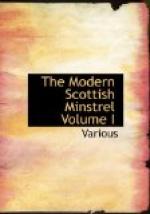of the uncommon attribute of genius. He was born
a healthy child, but soon after became exposed to
serious peril by being some time tended by a consumptive
nurse. When scarcely two years old he was seized
with an illness which deprived him of the proper use
of his right limb, a loss which continued during his
life. With the view of retrieving his strength,
he was sent to reside with his paternal grandfather,
Robert Scott, who rented the farm of Sandyknowe, in
the vicinity of Smailholm Tower, in Roxburghshire.
Shortly after his arrival at Sandyknowe, he narrowly
escaped destruction through the frantic desperation
of a maniac attendant; but he had afterwards to congratulate
himself on being enabled to form an early acquaintance
with rural scenes. No advantage accruing to his
lameness, he was, in his fourth year, removed to Bath,
where he remained twelve months, without experiencing
benefit from the mineral waters. During the three
following years he chiefly resided at Sandyknowe.
In his eighth year he returned to Edinburgh, with
his mind largely stored with border legends, chiefly
derived from the recitations of his grandmother, a
person of a romantic inclination and sprightly intelligence.
At this period, Pope’s translation of Homer,
and the more amusing songs in Ramsay’s “Evergreen,”
were his favourite studies; and he took delight in
reading aloud, with suitable emphasis, the more striking
passages, or verses, to his mother, who sought every
incentive to stimulate his native propensity.
In 1778 he was sent to the High School, where he possessed
the advantage of instruction under Mr Luke Fraser,
an able scholar, and Dr Adam, the distinguished rector.
His progress in scholarship was not equal to his talents;
he was already a devotee to romance, and experienced
greater gratification in retiring with a friend to
some quiet spot in the country, to relate or to listen
to a fictitious tale, than in giving his principal
attention to the prescribed tasks of the schoolroom.
As he became older, the love of miscellaneous literature,
especially the works of the great masters of fiction,
amounted to a passion; and as his memory was singularly
tenacious, he accumulated a great extent and variety
of miscellaneous information.
On the completion of his attendance at the High School,
he was sent to reside with some relations at Kelso;
and in this interesting locality his growing attachment
to the national minstrelsy and legendary lore received
a fresh impulse. On his return to Edinburgh he
entered the University, in which he matriculated as
a student of Latin and Greek, in October 1793.
His progress was not more marked than it had been at
the High School, insomuch that Mr Dalziel, the professor
of Greek, was induced to give public expression as
to his hopeless incapacity. The professor fortunately
survived to make ample compensation for the rashness
of his prediction.
The juvenile inclinations of the future poet were
entirely directed to a military life; but his continued
lameness interposed an insuperable difficulty, and
was a source of deep mortification. He was at
length induced to adopt a profession suitable to his
physical capabilities, entering into indentures with
his father in his fourteenth year. To his confinement
at the desk, sufficiently irksome to a youth of his
aspirations, he was chiefly reconciled by the consideration
that his fees as a clerk enabled him to purchase books.




